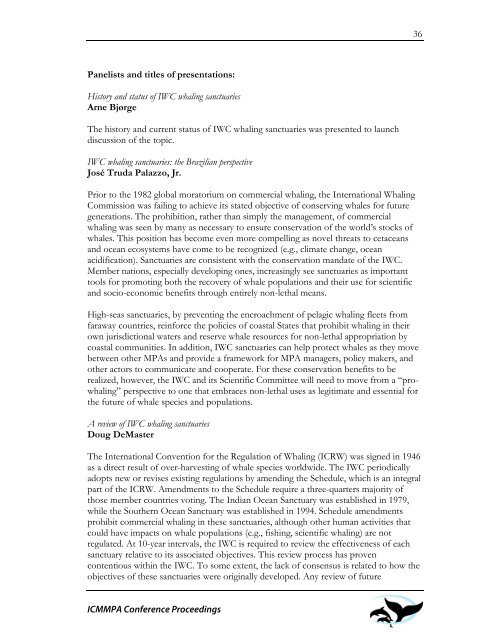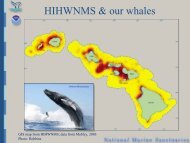The First International Conference on Marine Mammal Protected Areas
The First International Conference on Marine Mammal Protected Areas
The First International Conference on Marine Mammal Protected Areas
You also want an ePaper? Increase the reach of your titles
YUMPU automatically turns print PDFs into web optimized ePapers that Google loves.
Panelists and titles of presentati<strong>on</strong>s:<br />
History and status of IWC whaling sanctuaries<br />
Arne Bjørge<br />
<str<strong>on</strong>g>The</str<strong>on</strong>g> history and current status of IWC whaling sanctuaries was presented to launch<br />
discussi<strong>on</strong> of the topic.<br />
IWC whaling sanctuaries: the Brazilian perspective<br />
José Truda Palazzo, Jr.<br />
Prior to the 1982 global moratorium <strong>on</strong> commercial whaling, the <str<strong>on</strong>g>Internati<strong>on</strong>al</str<strong>on</strong>g> Whaling<br />
Commissi<strong>on</strong> was failing to achieve its stated objective of c<strong>on</strong>serving whales for future<br />
generati<strong>on</strong>s. <str<strong>on</strong>g>The</str<strong>on</strong>g> prohibiti<strong>on</strong>, rather than simply the management, of commercial<br />
whaling was seen by many as necessary to ensure c<strong>on</strong>servati<strong>on</strong> of the world’s stocks of<br />
whales. This positi<strong>on</strong> has become even more compelling as novel threats to cetaceans<br />
and ocean ecosystems have come to be recognized (e.g., climate change, ocean<br />
acidificati<strong>on</strong>). Sanctuaries are c<strong>on</strong>sistent with the c<strong>on</strong>servati<strong>on</strong> mandate of the IWC.<br />
Member nati<strong>on</strong>s, especially developing <strong>on</strong>es, increasingly see sanctuaries as important<br />
tools for promoting both the recovery of whale populati<strong>on</strong>s and their use for scientific<br />
and socio-ec<strong>on</strong>omic benefits through entirely n<strong>on</strong>-lethal means.<br />
High-seas sanctuaries, by preventing the encroachment of pelagic whaling fleets from<br />
faraway countries, reinforce the policies of coastal States that prohibit whaling in their<br />
own jurisdicti<strong>on</strong>al waters and reserve whale resources for n<strong>on</strong>-lethal appropriati<strong>on</strong> by<br />
coastal communities. In additi<strong>on</strong>, IWC sanctuaries can help protect whales as they move<br />
between other MPAs and provide a framework for MPA managers, policy makers, and<br />
other actors to communicate and cooperate. For these c<strong>on</strong>servati<strong>on</strong> benefits to be<br />
realized, however, the IWC and its Scientific Committee will need to move from a “prowhaling”<br />
perspective to <strong>on</strong>e that embraces n<strong>on</strong>-lethal uses as legitimate and essential for<br />
the future of whale species and populati<strong>on</strong>s.<br />
A review of IWC whaling sanctuaries<br />
Doug DeMaster<br />
<str<strong>on</strong>g>The</str<strong>on</strong>g> <str<strong>on</strong>g>Internati<strong>on</strong>al</str<strong>on</strong>g> C<strong>on</strong>venti<strong>on</strong> for the Regulati<strong>on</strong> of Whaling (ICRW) was signed in 1946<br />
as a direct result of over-harvesting of whale species worldwide. <str<strong>on</strong>g>The</str<strong>on</strong>g> IWC periodically<br />
adopts new or revises existing regulati<strong>on</strong>s by amending the Schedule, which is an integral<br />
part of the ICRW. Amendments to the Schedule require a three-quarters majority of<br />
those member countries voting. <str<strong>on</strong>g>The</str<strong>on</strong>g> Indian Ocean Sanctuary was established in 1979,<br />
while the Southern Ocean Sanctuary was established in 1994. Schedule amendments<br />
prohibit commercial whaling in these sanctuaries, although other human activities that<br />
could have impacts <strong>on</strong> whale populati<strong>on</strong>s (e.g., fishing, scientific whaling) are not<br />
regulated. At 10-year intervals, the IWC is required to review the effectiveness of each<br />
sanctuary relative to its associated objectives. This review process has proven<br />
c<strong>on</strong>tentious within the IWC. To some extent, the lack of c<strong>on</strong>sensus is related to how the<br />
objectives of these sanctuaries were originally developed. Any review of future<br />
ICMMPA <str<strong>on</strong>g>C<strong>on</strong>ference</str<strong>on</strong>g> Proceedings<br />
36



